How to get rich, find love and stay on top in Indian politics
- Published
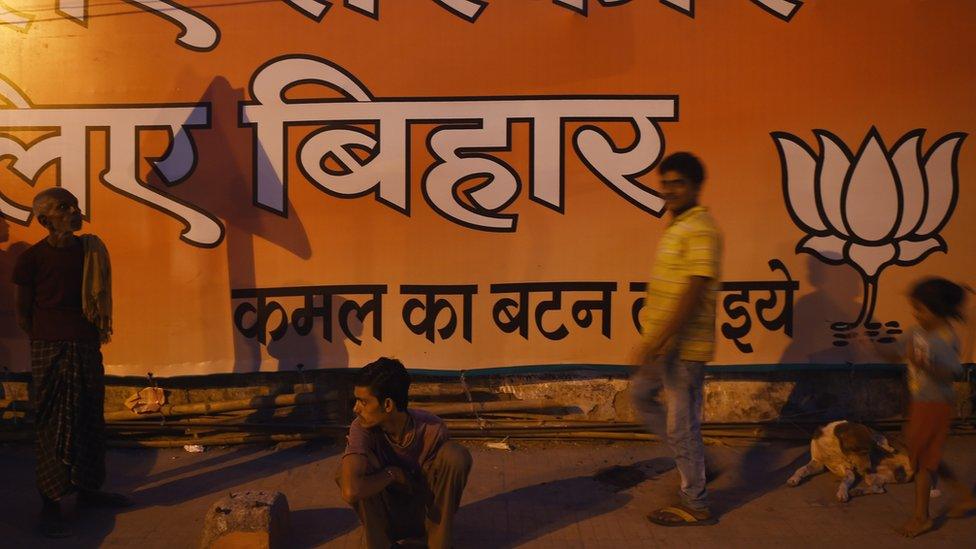
In the wreckage of Narendra Modi's terrible defeat in the key state of Bihar this week, lie the seeds of opportunity
How do you get rich, be happy, triumph at work and find love?
The bookshop shelves sag with bestselling volumes which claim that only they can guide you to success.
But they do all share a single simple idea: success starts with failure.
The message is that if your business fails, your advances are spurned or you don't get that job you wanted you shouldn't despair, you should be optimistic. Learn from your mistakes and succeed next time.
Wise advice no doubt, that the Indian Prime Minister Narendra Modi should heed.
Political hand grenade
Because, in the wreckage of his party's terrible defeat in the key state of Bihar this week, lie the seeds of opportunity.
Picking over the bones of the election, the Indian media has focused on Mr Modi's strategy of using sectarian rhetoric to fight local battles. And many identify the 23rd of September as a key watershed for the prime minister and his Bharatiya Janata Party (BJP).
That's when the boss of Rashtriya Swayamsevak Sangh (RSS), Mohan Bhagwat, tossed in the political equivalent of a hand grenade into the campaign.
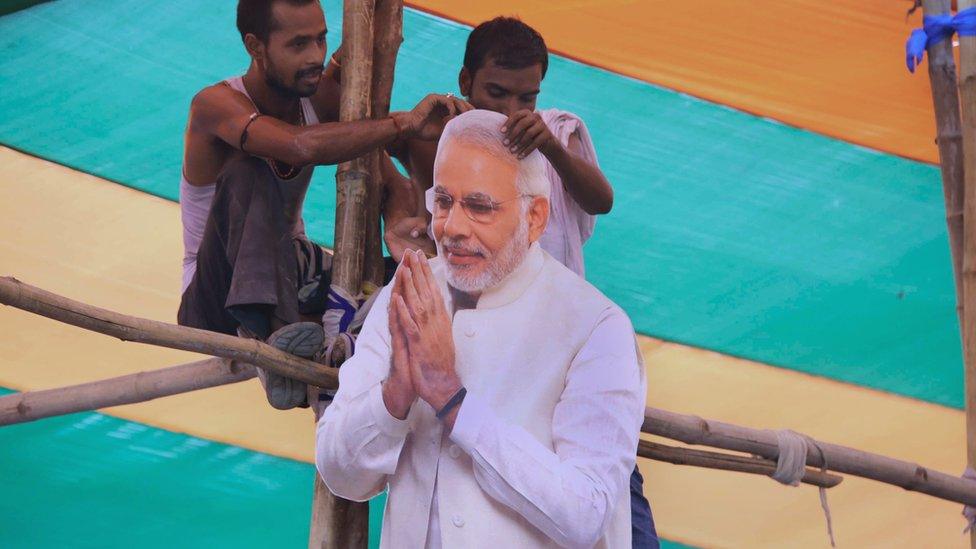
The RSS is reckoned to have played a key role in Mr Modi's landslide election victory a year and a half ago
The RSS is a huge and controversial volunteer organisation which regards itself as the custodian of Indian culture. It is very influential, sitting at the head of the family of Hindu organisations including the BJP.
The RSS is reckoned to have played a key role in Mr Modi's landslide election victory a year and a half ago, mobilising its army of volunteers to cajole and canvass voters on his behalf.
He was relying on it again this time around. Until, that is, Mr Bhagwat spoke out on the ever-sensitive subject of caste reservations.
Caste reservations are as contentious as the RSS itself. They guarantee the most disadvantaged groups in Hinduism's hierarchy not just equality of opportunity but reserved places in universities, government jobs and even seats in parliament and state assemblies.
Brutal lesson?
Mr Bhagwat's suggestion seemed innocuous enough: he proposed a "review" of reservations, suggesting - quite rightly - that they have been used for political ends.
But it was a disaster halfway through an election which was always likely to be won or lost on the basis of caste allegiances. A review of reservations represented a potential threat to the aspirations and livelihoods of millions of voters.
Indeed the electoral implications of making such a suggestion were so obvious many whispered that it was a deliberate attempt to undermine Mr Modi - a brutal lesson in who really holds power.
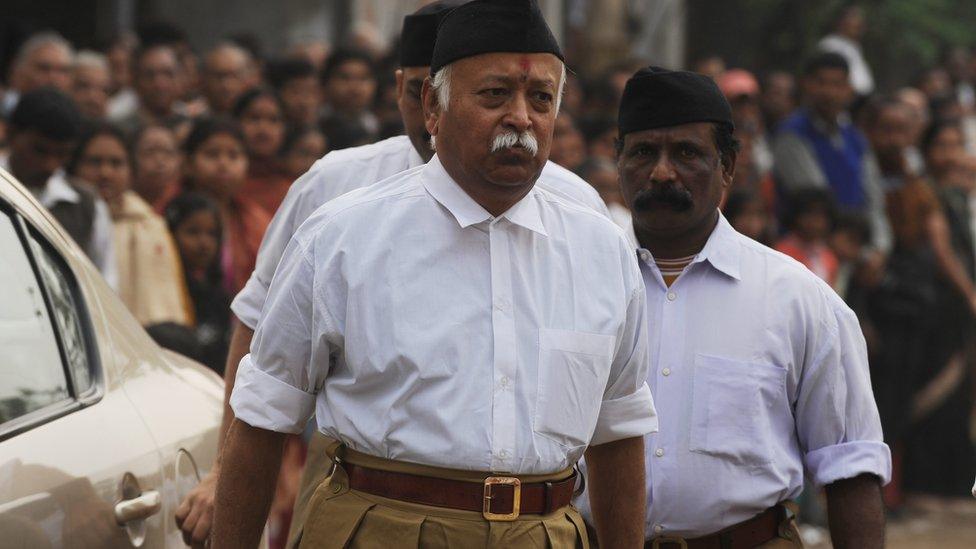
Mohan Bhagwat spoke out on the ever-sensitive subject of caste reservations, which is likely to have hurt Narendra Modi
The obvious answer for Mr Modi would be to distance himself from the RSS but that isn't possible. The BJP is an organ of the RSS. So what Mr Modi needs to do is find some way of marginalising the more extreme elements of the organisation and of his party.
Which leads us to the related issue of beef, another hugely contentious issue in a country where many regard the cow as sacred.
Mr Modi was criticised for failing to speak out sooner - or more decisively - to condemn the lynching of a Muslim man over rumours that he had been eating beef .
One reason he may have been reluctant to do so is because the BJP's strategy was to drive a wedge between the lower-caste Hindu and the Muslim vote banks which were the basis of the opposition "Grand Alliance's" electoral strength.
Growth concerns
The judgement of India's newspapers is that the approach backfired. Not only did it fail to divide the Grand Alliance's constituency it also alienated voters, not just in Bihar, but across the entire country.
It also added to concern about the growing atmosphere of intolerance in India which has been condemned by everyone from Bollywood stars like Shah Rukh Khan to Raghuram Rajan, India's central bank governor.
That, in turn, may end up damaging Mr Modi's bigger project, his promise to bring growth to India. That's because this undermines the reputation of India - and Mr Modi - abroad.
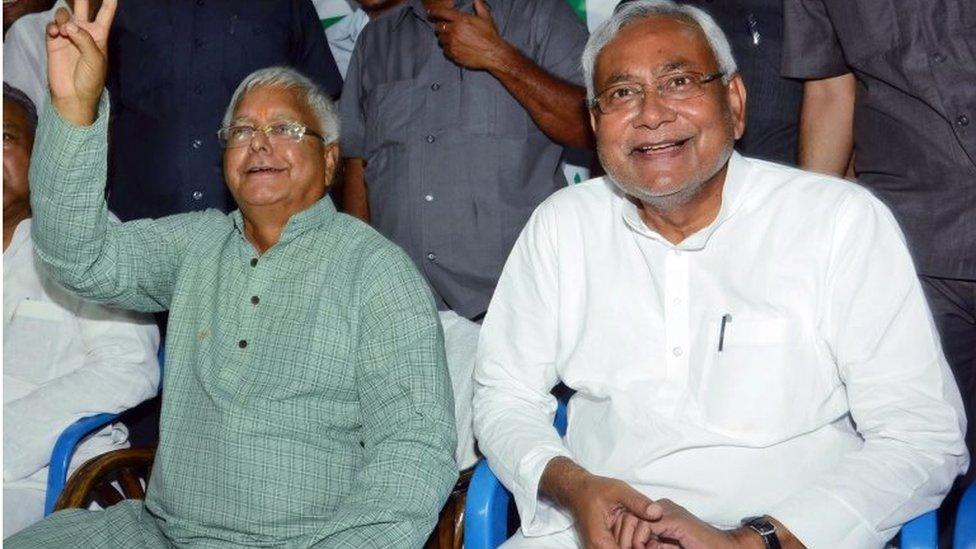
Mr Kumar and Mr Yadav face the tough job of staying together and working together for Bihar
Moving away from narrow Hindu nationalism could have another benefit for Mr Modi.
One reason the BJP fought such a vicious battle was because there was so much at stake. Mr Modi's economic reforms - on taxation, labour rules and land purchase - have been blocked in the upper house of parliament, undermining his ability to deliver on his election promises.
A more inclusive approach might help draw in cross party support and help get some of these key reforms passed.
Strong leader
So what would the self-help gurus behind the "failure is the mother of success mantra" suggest is the key lesson from all of this?
At root these are all issues of leadership.
Mr Modi was elected on the basis that he was the only person with the focus and strength to revive the Indian economy.
Maybe he needs to put development back at the centre of his agenda and reinvent himself as the strong leader he promised to be.
- Published9 November 2015
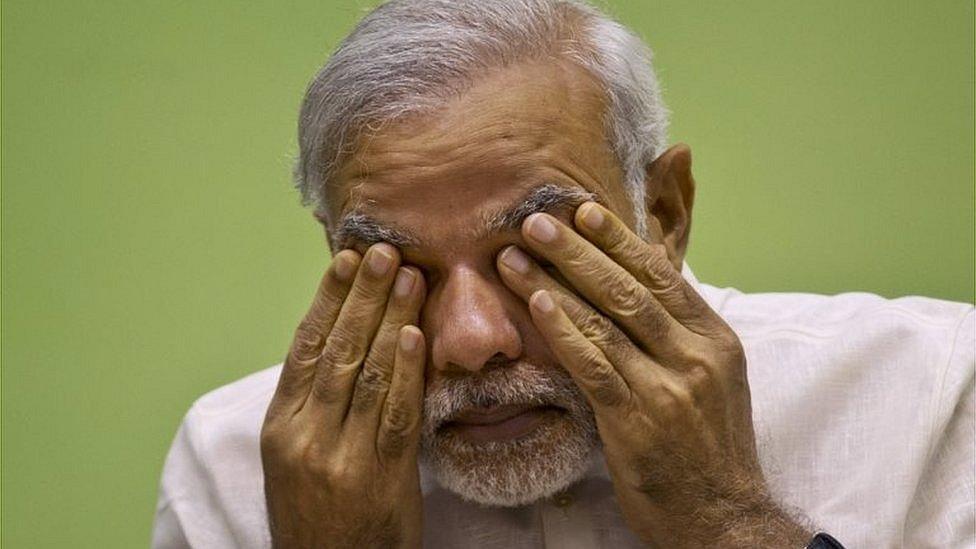
- Published8 November 2015